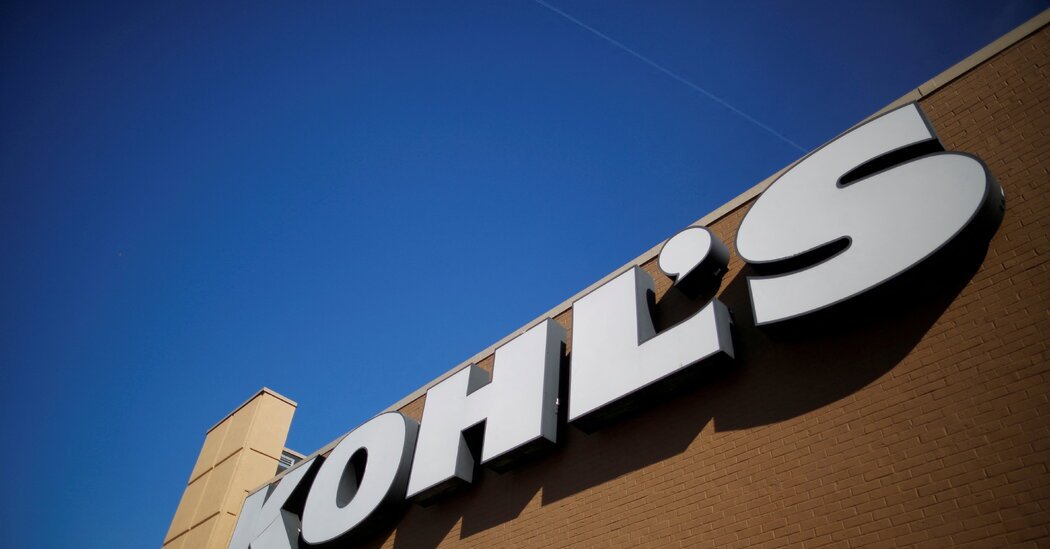Kohl’s Receives $9 Billion Offer Backed by Activist Investor – The New York Times
Advertisement
Supported by
The offer comes as the retailer, like other brick-and-mortar stores, struggles with supply chain problems and competition from online sites.
Send any friend a story
As a subscriber, you have 10 gift articles to give each month. Anyone can read what you share.
By Lauren Hirsch
The department store Kohl’s has received a roughly $9 billion offer to go private in a deal with an investment consortium backed by the activist hedge fund Starboard Value, according to two people familiar with the matter.
The offer highlights the resurgent interest that activist investors are showing in department stores, as brick-and-mortar retailers have struggled with supply chain issues in the pandemic and increasing competition from online sites. Shares of retailers have been under pressure for the past several years, while those of online sites have, until recently, been soaring.
Kohl’s is already under pressure to improve its share price. The activist firm Macellum Advisors, which has a 5 percent stake in Kohl’s, urged the retailer in a letter last Tuesday to explore strategic alternatives, including a sale. That was after it raised similar criticisms over Kohl’s stock performance last year.
The quick procession of Macellum’s letter and the consortium’s offer may be the beginning of a dance to put pressure on Kohl’s to consider a sale — or otherwise quickly boost its share price. In response to Macellum’s letter, Kohl’s said this past week that it was confident in its board and would “aggressively pursue the best interests of all shareholders.”
Kohl’s, based in Menomonee Falls, Wis., and founded in 1962, is a department store focused on casual wear, home wares and sporting goods. Unlike other retailers like Nordstrom, Kohl’s stores are frequently found in smaller shopping centers, rather than malls. That has made its real estate more valuable as malls have fallen on hard times.
A key question will be whether the Starboard consortium will secure the necessary funds to finance the bid, particularly given challenges posed by past leveraged buyouts of retailers, like Toys “R” Us, Payless and Neiman Marcus. Those deals saddled the retailers with debt, leaving them unable to make the necessary investments as e-commerce transformed the retail landscape. All three were eventually unable to make their loan payments and filed for bankruptcy. Both Neiman Marcus and Payless emerged from bankruptcy, while Toys “R” Us ultimately liquidated.
Shares of Kohl’s have risen less than 4 percent over the past year, giving it a market capitalization of around $6.5 billion. The offer, first reported by The Wall Street Journal, would value the retailer at $64 a share, 37 percent premium to its closing price of $46.84 on Friday.
Acacia Research Corporation, which is leading the bid, has been backed by Starboard since 2019. Starboard has helped Acacia raise a “significant” amount of equity capital to fund its offer, one of the people familiar with the discussions said. Acacia has also received a letter of confidence from a bank, this person said, stating that the bank believes it can help assemble part of the debt necessary for the transaction. Acacia is also in talks with a real estate firm that would sell off part of Kohl’s real estate to help fund the bid, this person said.
Both people who spoke about the matter requested anonymity because the offer is confidential. A spokeswoman for Kohl’s did not immediately respond to a request for comment.
Even with financing uncertainty, the offer could put pressure on Kohl’s since Macellum has threatened to nominate directors to Kohl’s board “if the status quo persists.” Macellum criticized Kohl’s in its letter for “mismanaging the business and failing to implement necessary operational, financial and strategic improvements.” It is pressuring Kohl’s to consider carving out its e-commerce business.
The pandemic sparked the problem. The highly intricate and interconnected global supply chain is in upheaval. Much of the crisis can be traced to the outbreak of Covid-19, which triggered an economic slowdown, mass layoffs and a halt to production. Here’s what happened next:
A reduction in shipping. With fewer goods being made and fewer people with paychecks to spend at the start of the pandemic, manufacturers and shipping companies assumed that demand would drop sharply. But that proved to be a mistake, as demand for some items would surge.
Demand for protective gear spiked. In early 2020, the entire planet suddenly needed surgical masks and gowns. Most of these goods were made in China. As Chinese factories ramped up production, cargo vessels began delivering gear around the globe.
Then, a shipping container shortage. Shipping containers piled up in many parts of the world after they were emptied. The result was a shortage of containers in the one country that needed them the most: China, where factories would begin pumping out goods in record volumes
Demand for durable goods increased. The pandemic shifted Americans’ spending from eating out and attending events to office furniture, electronics and kitchen appliances – mostly purchased online. The spending was also encouraged by government stimulus programs.
Strained supply chains. Factory goods swiftly overwhelmed U.S. ports. Swelling orders further outstripped the availability of shipping containers, and the cost of shipping a container from Shanghai to Los Angeles skyrocketed tenfold.
Labor shortages. Businesses across the economy, meanwhile, struggled to hire workers, including the truck drivers needed to haul cargo to warehouses. Even as employers resorted to lifting wages, labor shortages persisted, worsening the scarcity of goods.
Component shortages. Shortages of one thing turned into shortages of others. A dearth of computer chips, for example, forced major automakers to slash production, while even delaying the manufacture of medical devices.
A lasting problem. Businesses and consumers reacted to shortages by ordering earlier and extra, especially ahead of the holidays, but that has placed more strain on the system. These issues are a key factor in rising inflation and are likely to last for months — if not longer.
Macellum struck a settlement with the retailer last April that included the addition of three new directors to its board. Shares in Kohl’s have fallen more than 20 percent since then, as supply chain challenges have snarled the industry.
“We have continued to engage with Macellum since the settlement and are disappointed with the path they have taken and the unfounded speculation in their announcement and letter,” Kohl’s said in response to Macellum.
Kohl’s has argued that its efforts to invest in its online and active wear business are underway — and getting traction. In November, it reported that its third-quarter sales had jumped 16 percent. In December 2020, it announced a partnership with Sephora to help draw more shoppers to its stores. Its active wear business, which it is working to make more inclusive to all sizes, now makes up a little more than a quarter of its sales.
Advertisement




